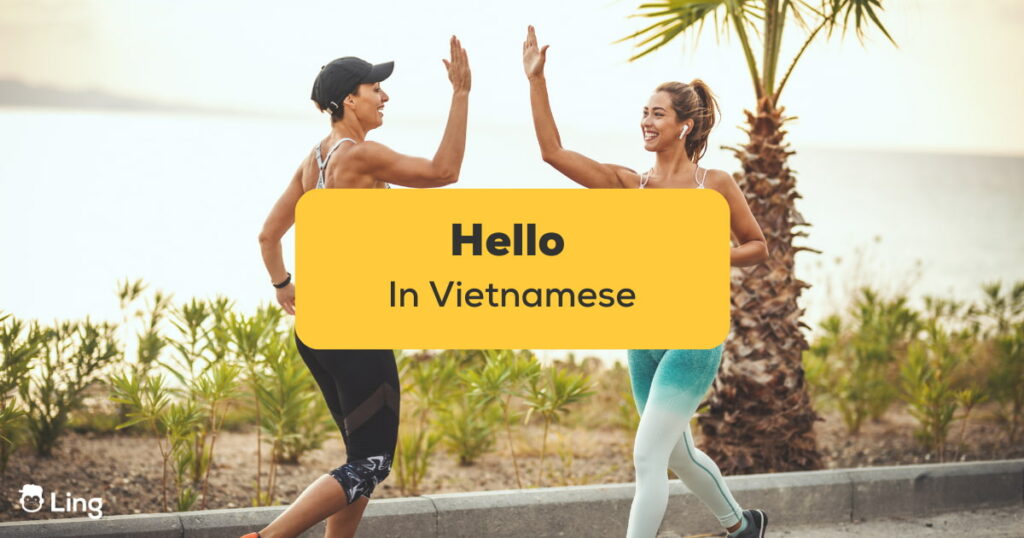Want to greet Vietnamese people, you can say “Xin chào” can be literally translated as “Hello” and “Hi”
Have the plan to travel to Vietnam? Learning how to say Hello in Vietnamese and some common phrases may enhance the quality of your trip because not all Vietnamese people can speak English, especially local vendors or people who don’t live near tourist attractions. In case you don’t know yet, using inappropriate phrases or pronouns in the Vietnamese language can be considered rude in some cases. So, let me help you learn how to greet Vietnamese people in different situations.
How To Say Hi, Hello In Vietnamese Language
“Hello”, and “Hi” can be literally translated as “Xin chào” (pronounced as /seen ciao/) or “Chào” /ciao/ in Vietnamese. Remember to pronounce the word “chào” with a low tone. It’s similar to when you say “Uhm” in English.
Generally speaking, you can use “Xin chào” or “Chào” to greet Vietnamese people in casual cases. It does not really sound natural to native Vietnamese, but they still appreciate that you put your effort into learning their language.
If you want to sound more “Vietnamese,” use the following sentence structures:
How To Use Chào Anh, Chào Chị, Chào Em, Etc.
The structure of this sentence is stated below:
Chào + a pronoun
I will share with you more details about the Vietnamese pronouns another time as we have so many of them 🙂 In this lesson, let’s learn very basic pronouns that you can use to call a Vietnamese person:
| When to use | Pronoun | How to say hello/hi |
| When the person you greet looks as at the similar age range with your parents or even older | Bác | Chào bác! |
| When the person is male and looks a bit older than you | Anh | Chào anh! |
| When the person is female and looks a bit older than you | Chị | Chào chị! |
| When the person looks as at a similar age as you | Bạn | Chào bạn! |
| When the person looks younger than you | Em | Chào em! |
| When the person looks much younger than you or seems to be at a similar age range with your niece/nephew if you have one | Cháu | Chào cháu! |
It’s a bit tricky to guess if someone is younger or older than you. Don’t worry! Even Vietnamese people can make mistakes sometimes. That’s why Vietnamese people tend to ask about your age when they first meet you. They use the right pronoun for the conversation if you guys are speaking Vietnamese together.
Using Em Chào Anh, Em Chào Chị, cháu chào bác, etc.
This sentence structure is similar to the first one, but begins with the subject, which means “I” in English:
Subject “I” + Chào + a pronoun (+ ạ)
Again, we have many different words for addressing “I” in Vietnamese. With the pronouns mentioned earlier, below are the words you should use to address yourself:
| Subject “I” | Pronoun | How to say hello/hi | Notes |
| Cháu | Bác | Cháu chào bác! | |
| Em | Anh | Em chào anh! | |
| Em | Chị | Em chào chị! | |
| Tôi | Bạn | Tôi chào bạn! | |
| Anh | Em | Anh chào em! | If you are a male |
| Chị | Em | Chị chào em! | If you are a female |
| Chú | Cháu | Chú chào cháu! | If you are a male |
| Cô | Cháu | Cô chào cháu! | If you are a female |
If you greet a person who seems to look older than you, add the ending word “ạ” to show your respect. Examples:
Cháu chào bác ạ!
Em chào anh ạ!
Em chào chị ạ!
How Do You Say Hello In Vietnamese Formally?
If you are going to give a speech at a conference or have a presentation in front of clients, saying “Xin kính chào (+ noun)” is more suitable. For examples:
“Xin kính chào tất cả các quý vị!” – My greetings to all of you.

Vietnamese Greetings Based Upon Time Of Day
Good Morning In Vietnamese
“Chào buổi sáng!” is the phrase you can use to greet someone in the morning, from about 6 am to 10 am.
Vietnamese people usually add the pronoun to address the person they are talking to, in order to show their respect. Therefore, you can say “Chào buổi sáng anh nhé!”, “Chào buổi sáng chị ạ!”, etc.
“nhé” is an ending word that has no meaning. When it’s added to an affirmative sentence, it helps soften the sentence. “ạ” is used to show your respect towards the person you’re greeting.
Good Afternoon In Vietnamese
The afternoon is translated as “buổi chiều” in Vietnamese. However, Vietnamese people don’t really say, “Chào buổi chiều!” (Good afternoon!) to each other.
Good Evening In Vietnamese
You can say, “Buổi tối vui vẻ!” – A happy evening! to greet someone you saw in the evening, from about 6 pm to 10 pm.
Good Night In Vietnamese
“Chúc ngủ ngon!” or “Ngủ ngon!” are phrases you can say to wish someone a good night.
You can also add a pronoun to address the person you give your wish to. Examples:
- “Chúc chị ngủ ngon!” (“Chị” is the pronoun used for the person who is female and looks a bit older than you)
- “Chúc em ngủ ngon!” (“Em” is the pronoun used for the person who is a bit younger than you)

Do Vietnamese People Say Sweet Dreams, Have A Nice Dream?
We have a phrase to say “Sweet dreams!” or “Have a nice dream!” in Vietnamese. It is:
“Chúc [a pronoun] có những giấc mơ đẹp!”
I wish you have nice dreams!
Example: “Chúc em có những giấc mơ đẹp!”
However, we rarely use this phrase to say it to friends or family members. In fact, this sentence might be used only between couples.
Get Attention From Someone, Use The Word “Ơi!” Or “Ê!”
Imagine when you are in a restaurant, and you want to get the attention of the waitress. What do you say in English? – “Excuse me!” with a gentle voice, right?
It will be a bit different in Vietnam as you might need to say it out loud, such as “Em ơi!”, and don’t forget to extend the word “ơi” for a longer period of time. You may say it’s weird to say it out loud or even shout out loud in a restaurant, but if you don’t do that, they may not be able to hear you. This especially works when you are inside a local restaurant where people tend to speak and laugh loudly.
You can use “ơi” with different pronouns, depending on whom you want to get the attention. You can also add the name of the person in front of the word “ơi”.
For example:
- Lan ơi! (Lan is a name of a person)
- Bạn ơi! (to call someone who looks the same age as you)
You can also use “Ê!” which sounds like “Hey!” in English. This is a very informal way to call someone. So you should use it with the people you know well, and they are the same as you or younger.

Other Basic Vietnamese Phrases For Greetings
Like in English, Vietnamese also has a lot of phrases to greet someone. Here are 9 more phrases you can use in daily life in Vietnam.
| English | Vietnamese |
| How are you? | Bạn khoẻ không? |
| Nice to Meet You | Rất vui được gặp bạn! |
| What’s up! | Có chuyện gì không? |
| Long time no see! | Lâu không gặp bạn! |
| It’s nice to see you again! | Rất vui được gặp lại bạn! |
| How’s your day? | Hôm nay bạn thế nào? |
| Have you eaten? | Bạn ăn cơm chưa? |
| Welcome to ___! | Chào mừng bạn đến với ___! |
| Have a good day! | Ngày mới vui vẻ nhé! / Ngày mới tốt lành nhé! |
| How’s it going? | Dạo này bạn thế nào? |
Kindly note that you can replace the pronoun “bạn” (i.e. you) with any other pronoun, depending on the person you are talking to. You can also omit the pronoun when both of you know exactly that you are talking to each other.
You may notice the question, “Have you eaten?” – “Bạn ăn cơm chưa?” that we use to greet someone in Vietnamese. In Vietnamese culture, it’s very common to ask someone if he or she has had a meal or not. This shows that you care about that person.
Vietnamese people also use a question form “(Name) + đấy à?” or “(Name) + à?” to greet people who they already know. For example, “Lan đấy à?”, “Lan” is a person’s name.

How Do Vietnamese Say Hello On A Phone Call Or Online?
To answer a phone call or start a conversation on the call, Vietnamese people say, “A lô!”. This sounds similar to “Hallo” in German, but the consonant “H” is not pronounced.
What about starting a text message on social channels? We usually use “___ ơi!” (put the name of the person you want to get attention to) or any other greetings mentioned earlier.
Saying Goodbye In Vietnamese
There are many ways to say goodbye to someone in Vietnam. Here are some examples:
| English | Vietnamese | Informal / Formal |
| Goodbye! | Xin tạm biệt! / Chào tạm biệt! | Informal |
| Goodbye! | Xin kính chào và tạm biệt! | Formal |
| Goodbye! | Vĩnh biệt! / Từ biệt! | Formal, only say when you don’t see someone ever again. |
| Bye! | Chào nhé! / Đi nhé! | Informal |
| See you later! | Gặp lại sau! | Informal |
| See you later! | Hẹn gặp lại! | Formal |
| Keep in touch! | Giữ liên lạc nhé! | Informal |
| I hope to see you again | Mong được gặp lại (+ pronoun) | Formal |

Bowing Or Waving A Hand To Say Hello In Vietnamese Culture
Vietnamese people don’t wai as Thai people do to greet other people. Instead, there are different ways to say hi in Vietnamese culture, but they are not compulsory.
Bowing To Greet Elder People
So how do you greet elderly people? Similarly, you can bow the way they do in Japan, but Vietnamese people don’t bow too low. You can bow your body a bit when you see an elder greet them.
Waving A Hand To Say Hello To Your Friends
If you see your friends, you can smile and wave your hand to say hello to them. Vietnamese people are friendly, but in Vietnamese culture, we will try not to touch other people, especially if we are just friends. That’s why you may see that not many Vietnamese people hug each other when they meet.
When In Vietnam, Say Hello As The Vietnamese People Do
Although you might find it hard to learn such many ways to greet someone in Vietnamese, it’s still worth knowing some of them. Learning a language is not just learning how to say it as a foreigner, but learning about the culture and how the native speakers actually say it in their daily life. For this point, you can trust the Ling app to teach you real Vietnamese because the Vietnamese course was prepared by native Vietnamese speakers!
It’s even better when you practice Vietnamese with local people when you have a trip to Vietnam. Check out some Vietnamese regions and popular Vietnamese food to enjoy your trip even more!
On the other hand, if you’re already on your trip or even just thinking about learning a new language today, why not download the Ling app? It’s just a few clicks away on the Play Store or App Store. It could be your chance to improve your skills in reading, listening, writing, and speaking Vietnamese.































































